Army Vietnam War Lansing, IL Flight date: 04/10/24
By Al Rodriguez, Honor Flight Chicago Veteran Interview Volunteer
Donna Cooley enlisted in the Army at a time when military duties that were traditionally done by men started opening up to women. She said “it was a tough time for women because the Army wasn’t prepared and didn’t know what to do with us.” It was women like her working in these male-only positions with the difficulties that were presented that helped pave the way for future generations of military women. This experience, which tested her determination and morality, helped her later in life when she was promoted as the first woman turn manager in a Northwest Indiana steel mill.
Donna was born in Hammond, Indiana. She grew up with seven siblings in a three-bedroom house. Her father was a WWII Navy Veteran and two of her brothers served in the Army. She graduated from Gavit High School in 1972 and worked part time jobs before hiring into Inland Steel Company in 1973. Her job was as a union laborer working in the Main Storeroom.
As she worked, she thought about joining the military to pursue her love for law enforcement. The Army recruiter was the only one that promised her a job with the Military Police. Right before reporting for the Army she broke her leg playing 1st base in a women’s fast pitch softball league: the batter slid into her to see if she would drop the ball. She didn’t. Her family and friends told her that she should back out of joining the Army because there was no way she could complete the physical part of basic training with a recently healed leg. She ignored them, determined to finish what she started. As soon as she healed up she traveled to Fort Jackson, South Carolina, to start basic training. She was in an all-woman platoon. The platoon bonded so well that they still hold reunions today, although fewer attend.
After basic training in January of 1975, she was sent to Fort Gordon, Georgia, for Military Police Training, There were very few women in the class and they were paired up with a man. In eight weeks they were taught many aspects of law enforcement, pistol qualification, driver’s training, interception and search, patrol operations and records and forms, point control traffic, convoy and escort security, ID and control, even judo. Donna was selected to be a class Squad Leader. This was a very challenging course. If you failed a section, you were gone. Her class graduated 14 women and 150 men. Their motto was “Pull your boot straps up and keep on trucking”.
After completing her MP certification, her first permanent assignment was with the 139th MP Company at Fort Benning, Georgia. There were six women MPs assigned to the main WAC barracks on the base. The other WACs who mostly worked during the day weren’t happy to have MPs living with them and made them uncomfortable. The MPs worked shift work and when they were sleeping the other WACs made it hard for them to sleep. After a few weeks the MPs were moved to the unit MP barracks with the men. They setup a women’s floor there. Donna felt that many of the male MP’s felt threatened by women working in their jobs. She said that unlike the woman nurses who were many and could support each other, she found herself alone among men and didn’t have their support system.
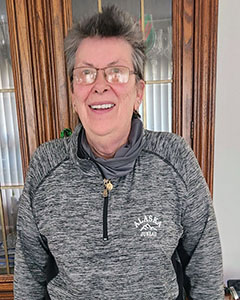
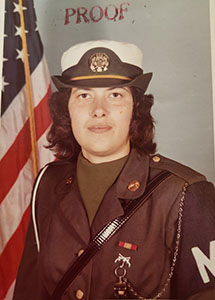
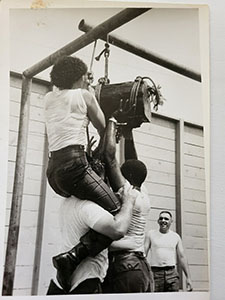
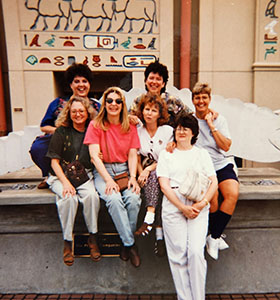
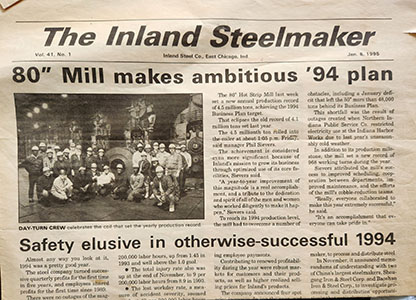
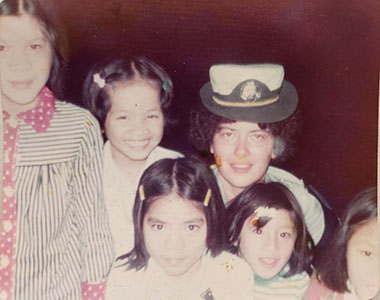
Donna remembers being assigned to traffic control and standing on a halved 55-gallon drum in the middle of the street directing traffic. This was not easy to do in her uniform which at the time consisted of a pol hat, jacket, skirt and nylons. For equipment she had a whistle, white gloves and a yellow raincoat for visibility. Shortly after arriving at Fort Benning, Donna was asked to be a test subject to wear pants with the uniform. She said she loved the comfort of wearing the pants and it made traffic control simpler. Pants became standard wear for female MP’s. She remembers working with the Columbus Police Department to pick up disorderly Army personnel. One of her fondest duties was guarding 200 Vietnamese refugee children that were temporarily housed at Wilbur School on the base. She said the kids were very sweet and friendly and she couldn’t understand why the local people protested and showed so much anger towards them. Shortly afterwards, Donna requested to be transferred.
In January 1976 she was assigned to the 728th MP Company at Camp Hialeahm, South Korea. Along with her usual MP duties they also patrolled the ships in the harbor. She taught the local Korean businessmen English. Donna was chosen for leadership training and attended the NCO academy. They did many exercises in team building and leadership skills. In August all military bases went on lockdown because of the “Tree Day War”. A work party was sent to trim a poplar tree that was obstructing their view at the DMZ. They were attacked by North Korean soldiers, two American officers died and many of the work detail were injured. In a show of force American troops supported by gunships cut the tree down. The North Koreans did not respond.
Donna was asked to go on temporary undercover duty for three months, posing as a tourist to try to determine the source of the illegal drugs finding their way on to the bases in South Korea. They had her dress in civilian clothes and staying in local hotels. Donna said she didn’t know why she was selected for this dangerous assignment as she was a new MP. When it ended she was promised a promotion which never happened. During her time at Camp Hialeah, she experienced male intimidation from a person in a leadership position. He humiliated her and made her time there miserable but she persevered.
In June of 1977 she went back to the U.S. and was assigned to the 204th MP Company at Fort Sheridan in Highland Park, Illinois. Along with her usual MP duties she was involved in AWOL apprehension, drove prisoners to and from facilities and escorted six prisoners to Fort Carson, Colorado. Donna left the Army in November 1977. She loved being an Army MP but didn’t feel the Army had the resources or discipline to hold people accountable and make her comfortable facing another situation as in Korea.
Donna took a few weeks off before returning to work at Inland Steel. She was elected as a union steward. In October of 1989 the company was looking to promote women into management positions, so she was promoted on a trial basis to Hourly Labor Foreman. Donna said she loved the job and having come up through the ranks, understood how to get the job done. Her Army MP training taught her how to deal with adversity and how to communicate with people. Just like when she was an MP it was mostly men in her mill crews and many of them didn’t want a woman telling them what to do. She said she was tough but fair. Her expectations were for you to come to work, show up on time and do the job you were assigned. Unfortunately, she fought all the time with the people to get the work done. People who did their work loved her and those that didn’t hated her. Her nickname was the Dragon Lady, even though she never used her judo skills at work.
Donna was promoted to a salaried position becoming a Shipping Foreman. She was promoted to other management positions and was the first woman at Inland Steel to become the 80” HS Mill Turn Manager, the highlight of her career. This position is one of the most important in the steel company. At the 80” Mill, steel slabs are converted to coils. The coils are used to make cars and appliances. The revenue from the coils is how the steel company makes money. The companies receiving them are dependent on receiving them with time critical shipping to meet their production schedule. Any delays with making coils will cause revenue loss so decisions made by the turn manager are crucial. The nickname for the 80” is the “heartbeat” of the company.
Donna retired in 2015. She loves to travel. She’s been to Poland three times in search of ancestral information. She’s also been to London and has made multiple trips to Florida before she decided that she is a Midwesterner.
Donna has been to D.C. to the Women in Military Service in America Museum but has never been to the WWII or Korean Memorials. She is looking forward to going to D.C. with the other vets for the experience, the camaraderie and bond that veterans naturally have for each other. She’s hoping she knows someone on the flight.


